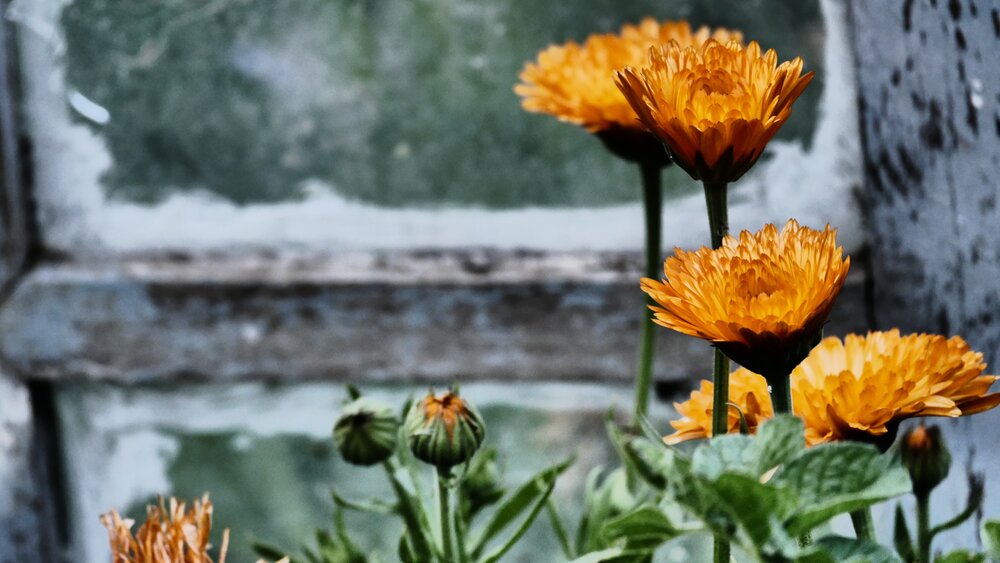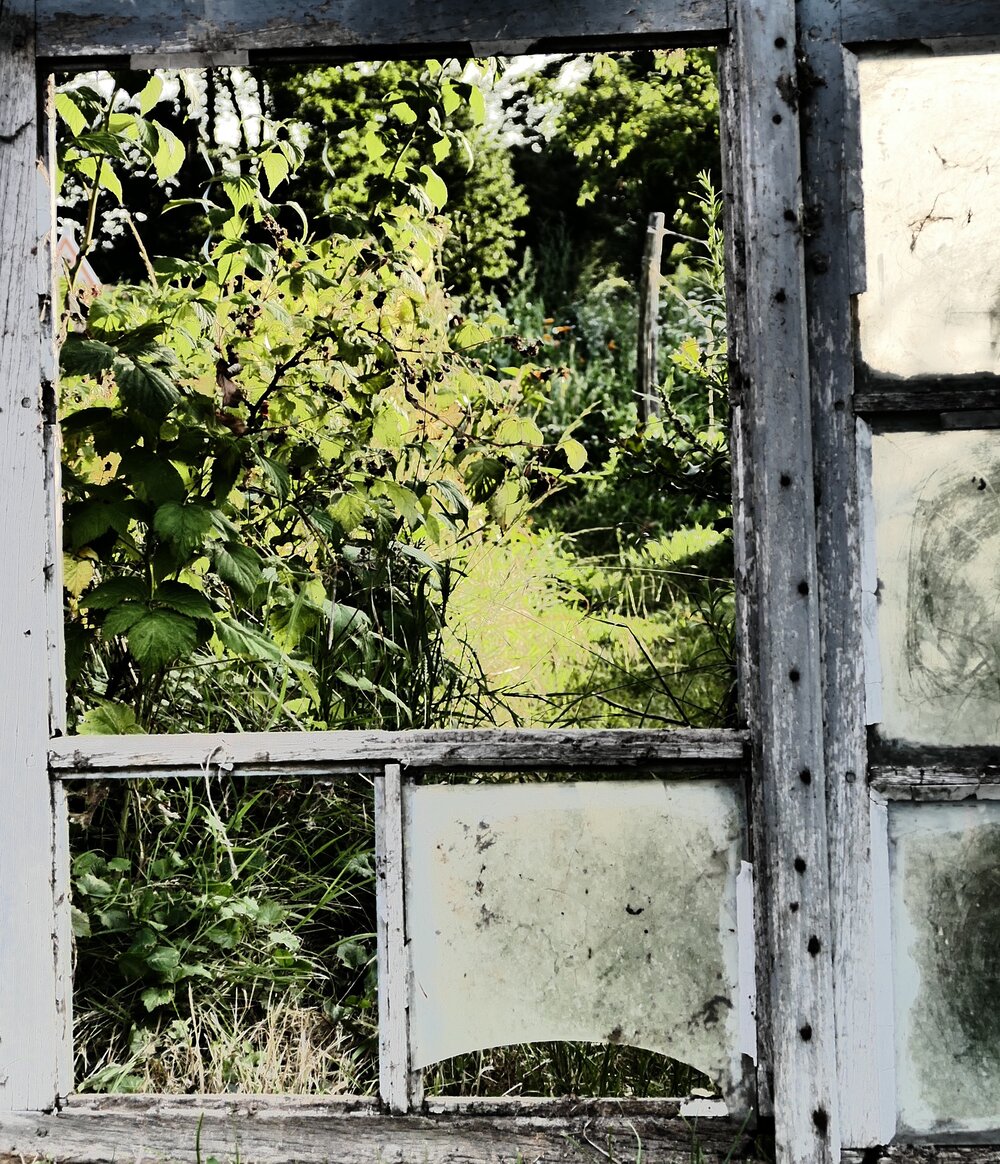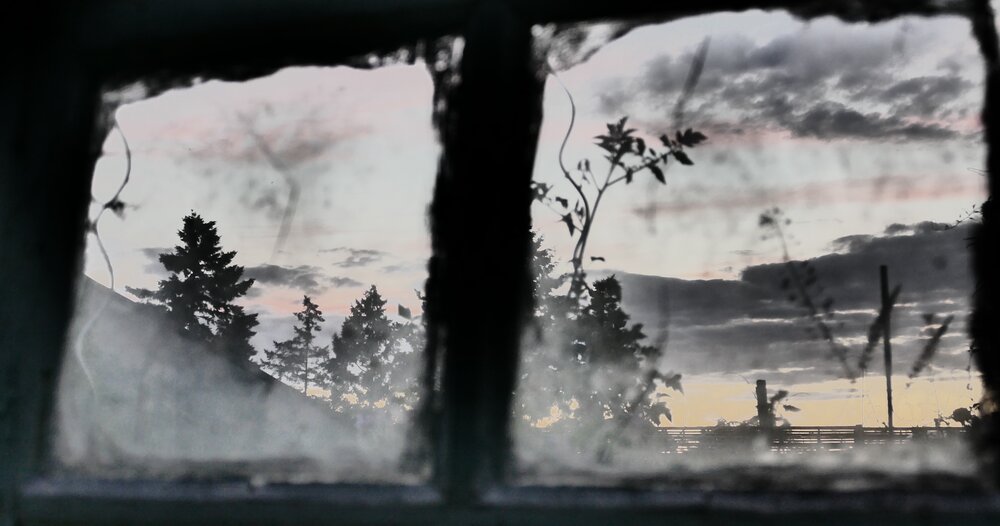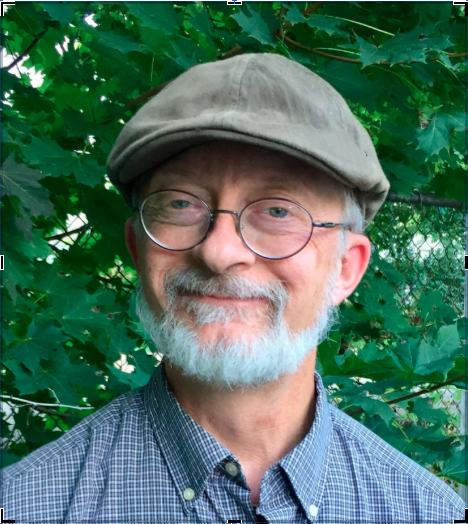Essay by John Jacobson
Finding Courage and Meaning While Tending the Garden

It’s a caregiver’s garden. Weeds are out of control. It is late for planting. I pry with the shovel. A burdock breaks loose. I lift the heavy plant out. Some of its roots are left. Will it sprout again? Probably. Weeds are persistent.
I stomp on the shovel again at the edge of a raised bed in our vegetable garden. It goes down a couple of inches and strikes the hard root of another burdock. Its huge, wavy-edged leaves quiver at the ends of green stems as thick as rhubarb.
I pry against the root. Nothing happens. I pull a fistful of field mustard with stalks of tiny yellow flowers. I feel their roots tear. I push the shovel again. It goes a little deeper.
“Birdiebirdiebirdiebirdie!” a cardinal calls. A red-bellied woodpecker sounds a shrill rolling note. Pale-green maple keys lie scattered on the ground. Heat is building. I sweat. I want to slow down and enjoy this moment, but Claudia is alone in her hospital bed in our living room, so I hurry instead.
As I carry an armful of weeds and pile them at the end of our driveway, a memory sweeps into my mind.
It was the day after Christmas last year. Tiny white lights spiraled up our grapevine Christmas tree. Claudia’s collection of Santa Clauses and snowmen were lined up on shelves of the tall bookcase between the windows. Two lamps glowed softly on pale green walls. I didn’t want our holiday to end.
I remember unfolding a little wooden table beside her bed rail by the chair I had brought from the dining room. I spooned bubbling shrimp scampi over mounds of angel hair pasta in white, wide-rimmed bowls. I sprinkled Parmesan cheese and chopped parsley over each.
Along with two glasses of Pinot Grigio, salad bowls, and vinaigrette dressing, I brought the steaming scampi to the living room, spread a towel over Claudia, and pulled it up to her chin. Leaning down, I put my arms around her, rested my forehead against hers, and whispered, “Thank you, Lord, for my lovely wife.”
Claudia whispered her own prayer.
“Is your head up enough?” I asked.
“No.”
I reached over her and pushed the control. The head of her bed rose.
We ate in silence. Claudia focused intently on each bite. I tried to eat more slowly. The shrimp were pink, white, and succulent. The sauce was savory with garlic, butter, lemon, and wine.
“John . . . !”
Claudia gasped. I shoved the folding table away and leapt to my feet. I lifted her forward. She was still gasping. I pounded her back between her shoulder blades.
“Did it move?!”
She didn’t answer. Her eyes were wide. Tears ran down her face. She gasped. I pounded.
She coughed.
“Are you OK?”
She nodded.
She breathed heavily.
“Was it a shrimp?”
“I guess I can’t eat a whole one at once,” she said. Tears still streamed down her cheeks.
“Let me cut them in two then.”
I got a knife from the kitchen and cut each of her shrimp in half.
I hugged her again.
“Don’t be scared, sweetheart. Try to enjoy it,” I said.
My celebratory mood was gone. I struggled to contain my emotions. They came rushing up from the deep, dark well of struggling with my wife’s illness for the last fourteen years. Claudia’s rare disorder, neuromyelitis optica, struck with frightening vengeance on her fifty-fourth birthday, leaving her paralyzed and on a ventilator in the ICU for months.

It seemed unfair that both of our lives were made harder at a time when we should have been reaping the rewards of our success. I remembered when Claudia was beautiful and strong. I remembered walking and holding hands, with her high heels clicking on the sidewalk, and how she was taller than me when she wore them. Before her illness, we worked together in the garden. It wasn’t choked with weeds then. She was my north star, a fixed point in my world. Now she was too weak to stand. She was struggling just to eat. I felt uprooted and alone. My heartbeat raced. I wanted to scream, “Why, goddamnit?!” “WHY, GODDAMNIT?!”
Was this how I would lose her? How can we be strong when life is so fragile? What was the meaning of this? It felt like punishment. For what?
If we are certain of anything, it is that we live with losses. We hold them in abeyance, both in the sense of putting them aside and in anticipation of them.
I closed my eyes. I focused on just breathing. I felt muddled. Does anyone ever really understand such loss?
For now, I put the memory and the last of the weeds in the pile and hurry inside. I never know when things will go wrong. Every moment is urgent. The air conditioner hums in the living room window. Claudia’s oxygen concentrator puffs. She is slumped to her left, looking pale. Her breath rattles with every inhale and exhale.
“It’s time for percussion and a nebulizer,” I say as I lower the head of her bed. “Turn on your side.”
I pound a drum roll on her back with cupped hands. She coughs and coughs. Her face turns red.
“Did it move?”
“I think so,” she says.
“Let’s do the other side.”
When I’m done, I fill her nebulizer cup with ipratropium bromide and albuterol sulfate solution. The machine rumbles. Steam billows from the end of corrugated tubing. Claudia breathes in the mist. I feel guilty for spending so much time in the garden.
In her book Refuge: An Unnatural History of Family and Place, Terry Tempest Williams said, “Grief dares us to love once more.” Love, joy, loss, and grief are all flowers on the same vine. They are inextricably linked together. All that we love we will grieve for one day.
Caregivers grieve again and again. We must not let weeds of loss and grief overcome us, though. It is a struggle. Weeds grow so fast.
While the nebulizer runs, I take my old paperback copy of Louise Glück’s The Wild Iris from the tall bookcase between the windows. There are seven poems titled “Matins.” The fifth one, an extended metaphor of flowers and weeds, sounds like a morning prayer. As I read, I picture her on her knees in her garden, pulling up clumps of weeds, feeling roots tear, knowing loss will come but trying to hope.
. . . You ought to know
I’m never weeding, on my knees, pulling
clumps of clover from the flower beds: in fact
I’m looking for courage . . .

Publishing Information
- Refuge: An Unnatural History of Family and Place by Terry Tempest Williams (Pantheon Books, 1991).
- Quoted lines are from "Matins" in The Wild Iris by Louise Glück (Ecco Press, 1992).
Art Information
- “Happy Day,” “Pathway to Her Heaven,” and “Afraid of the Day” © Fabrice Poussin; used by permission.
 John Jacobson lives in the Catskill Mountains of New York. His writing has appeared in numerous publications including About Place Journal, Aji Magazine, Chautauqua Literary Journal, The Dew Drop, Impermanent Earth, and Still: The Journal. His writing has been nominated for a Pushcart Prize, Best of the Net 2018, a John Burroughs Nature Essay Award, and was a finalist to the Barry Lopez Creative Nonfiction Award. For the past fifteen years he has been a caregiver for his wife, Claudia. He is working on a memoir about that experience.
John Jacobson lives in the Catskill Mountains of New York. His writing has appeared in numerous publications including About Place Journal, Aji Magazine, Chautauqua Literary Journal, The Dew Drop, Impermanent Earth, and Still: The Journal. His writing has been nominated for a Pushcart Prize, Best of the Net 2018, a John Burroughs Nature Essay Award, and was a finalist to the Barry Lopez Creative Nonfiction Award. For the past fifteen years he has been a caregiver for his wife, Claudia. He is working on a memoir about that experience.
